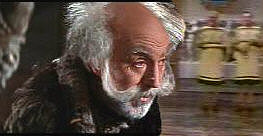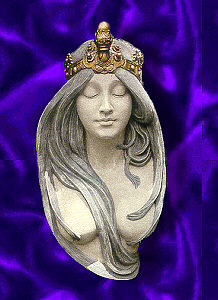
Free Girls!

 Free Girls! |
|

|
The Loves of Gelvath
A tale of Zhor
Excerpted from the Chronicles of Sylgarth
by Vremya
 |
Why the tart black grapes that make the cyrgor can be made to grow nowhere else but on the rolling slopes of Sylgarth's hills, none knows--or, as some would have it, those who know are bound by terrible oaths not to tell. Why the women of Sylgarth make the best passion slaves, this tale will tell.
I. The Choices of Zaeros
For a long time, Sylgarth was ever at war with its neighboring states of Fornallon and Denwyr. Sometimes, a truce was sought with Fornallon, sometimes with Denwyr, but howsoever the fortunes of war wended this way and that, the land was never at peace.
In that time, Zaeros was king of Sylgarth. He had a son named Wyvran, a brave and cunning warrior, but a great battle with Denwyr tragically claimed his life, when a treacherously poisoned arrow hit Wyvran in the shoulder. The forces of Sylgarth rallied around their wounded lord and eventually won the battle, but by the time the last Denwyrean troops had been routed, the poison had done its work, and Wyvran lay dead.
The death of his beloved son left Zaeros with two heirs--the sons of two of his former brothers who had become his sisters when he himself ascended to the throne. For Sylgarth is one of the lands that holds to the custom of Ardaith, by which the superfluous heirs of royal blood are given Ruk's Serum when a new king is chosen, to prevent them ever disputing the rightful heir's right to the throne.
One of the king's nephews was named Gelvath. He was a great and doughty fighter, and had proven his prowess with sword, spear, and longbow many times in the wars. Indeed, in that last fateful battle he had fought side by side with Wyvran, and had stood by the king's son to the last, bravely attempting to draw the poison from the wound with his lips, at great hazard to his own life. All his fellow warriors said that when Wyvran had been cut down, they had been ready to give in to despair and defeat, were it not for Gelvath's example and guidance giving them the strength to win the day.
The king's other nephew was called Cathmor, and though his courage in battle, if perhaps not his prowess at arms, was as great as that of his cousin Gelvath, his chief delight had ever been in scholarship and learning. It is said that at Sylgarth's darkest hour, when the city itself was invested and besieged by the combined forces of Denwyr and Fornallon, and flaming arrows fell on Sylgarth's great library, Cathmor at great peril to his own life saved much of its flaming contents from ruin, thus preserving all Sylgarth's knowledge and history.
The battle that claimed Wyvran's life cowed Denwyr, but the threat of Fornallon grew in turn, as skirmishes and sorties along the borders promised to erupt into open war at any moment. Therefore, when Zaeros the king summoned Cathmor and Gelvath into his presence, they fully expected to have a council of war on how to stave off Fornallon. Indeed, the king's first words seemed to confirm their suspicions.
"My beloved nephews," Zaeros began, "our victory has left Denwyr in turmoil with the loss of many of its ablest warlords, and it is now given over to internal strife. Were I a more warlike man, I might choose to attack Denwyr in its weakness. But I have ever sought peace, and I would much rather see the price we paid in blood buy us peace than yet more strife--even victorious strife."
Gelvath and Cathmor knew how much the king had loved his son, and bowed their heads in mournful silence.
"I would not have had it this way," the king went on, "but Fate often exacts a price not to our liking when it grants us our deepest wishes. My son's life has bought us peace with Denwyr, and now Fate has put a hard choice before me that may yet buy us peace with Fornallon. The Duke of Fornallon has no wife, and no heir. He will give us peace, if we--if I--can give him what he wants."
There was puzzlement in the eyes of his nephews now, but they still did not question him.
Zaeros raised his arm, which had been resting on the arms of his throne, and held it out straight before him. Both princes could see how his arm trembled, faster and faster, as a leaf might shiver in a rising stormwind.
The king let his arm fall back, and beckoned his nephews to come
closer. Slowly, he hunched up his sleeve, revealing
his bare forearm. The arm was covered with dark, blotchy bruises,
tinged at the edges with an unwholesome green.
Gelvath gasped in dismay. Cathmor clasped the king's hand and cried,
"Alas, poor Uncle! It is the curse of--"
"Yes," the king's voice broke in wearily, and now for the first time the two cousins realized how tired and spent he sounded. "It is the curse of Selyf-Digon."
 |
Gelvath drew back instinctively, though he knew
the disease was not contagious by touch. Cathmor still clasped the
king's hand; men of Zhor do not shed tears readily, but his eyes
gleamed moist. "There are but two outcomes to choose from," Zaeros resumed, "I can wait and have the disease slowly waste me away, until I choke for lack of strength to breathe--or I can take Ruk's Serum." |
Gelvath shook his head, his fists clenched in baffled fury, but the king went on before he found words to interrupt. "As a woman, I can offer myself to the Duke of Fornallon, to be his wife, and mother to the heirs he so deeply craves. To be my own peace gift, and forestall war by an offer of love rather than an offer of arms--it is not a choice I would willingly have made, but if Fate grants me no other save a slow death, is it not a wise choice?"
Gelvath remained silent. All of his heart cried out against the king's decision, but his warrior's mind was accustomed to hard choices, whether made in the heat of battle or the cold of midnight tents on campaign, and he could not help but see the wisdom of it. He took a deep breath, and when he spoke again, it was in the level, disciplined voice of a general discussing battle tactics. "The Duke might refuse your offer. Fornallon bears us no great love, and his wish for a consort may not be as strong as his wish to conquer us."
The king nodded. "I did consider that possibility. I have sent emissaries to Fornallon in secret. The Duke has already decided to accept my offer. All that remains is for me to take the final step."
Slowly, so his trembling hands would not knock it over, Zaeros reached for a small table next to his throne, covered with a silken cloth, which the two princes had noticed but dismissed without curiosity when they entered the room. With a gentle tug, the silk fluttered to the floor. On the table stood a small tray, and in the tray lay two syringes.
Two syringes. Cathmor's lips soundlessly mouthed the words as he stepped back. Gelvath did not speak or move, but the red glow of anger in his face gave way to a dreadful pallor.
"Both of you, of course," Zaeros said slowly, "know that only one of you can be my heir. The other must, like myself, come to womanhood. Our house has held to the custom of Ardaith since the time of my great-grandfather, and--"
While the king spoke, Cathmor watched his cousin. Gelvath's face was pale but without expression--the face of a condemned man waiting for his final verdict. His eyes showed no fear, but a shadow of defiance was starting to creep into the corners of his eyes. To give my life for my king and country--yes, with all my heart, said those eyes, but to give my manhood? Never!
The king was still speaking. "--given it much thought, and I have come to the decision that the best--"
Quickly, Cathmor broke in. "Dearest Uncle! Sovereign lord, my king, I beg of you, let me--I mean," he stumbled over his words and tried again, "You need not burden yourself with making a choice for us. Let me be the one to take Ruk's Serum with you! I am but an indifferent warrior, a man of letters. Like you, I hope that your marriage to the Duke of Fornallon would bring us peace. But peace should always be watchful of those who would monger war. Denwyr is harmless enough for now, but who knows for how long? My cousin Gelvath is much the better warrior of us. Sylgarth needs his manhood more than it does mine. I beg you, let me choose womanhood for myself, as you have!"
Zaeros listened to his nephew's rush of words in silence. In his heart, the king would rather have chosen Cathmor as his heir--in part for the boy's greater wisdom, as shown even by his appeal. Also, the king secretly resented Gelvath for not dying on the battlefield with his son--or even in Wyvran's stead. However, Zaeros was a just king, and no just ruler allows his own feelings to cloud his judgment. Knowing that his resentment of Gelvath was unjust and irrational, the king was determined to give him a fair chance.
Thus, he brushed aside Cathmor's plea for the syringe with a dismissive gesture. "Attend to me, my dear nephews! I do not mean to impose my own choice on you. Either one of you would be a good king, I know. Therefore, I wish to leave the choice to Fate. I have here two tagal dice." He laid two eight-sided dice on the table. "I propose that the two of you roll dice to find out which one of you is destined to be my heir."
Cathmor looked at his cousin, whose face was still blank and pale.
Gelvath made a brief gesture inviting him
to roll the dice first.
None dared draw breath as the dice rolled across the table. When they
finally came to rest, their upturned faces
showed two pips each.
"Four," Zaeros murmured hoarsely. Very nearly the lowest tagal score
possible.
Cathmor saw his cousin's face light up with relief. It cheered him
greatly, for he dearly loved his cousin, and
he truly believed Gelvath deserved to be king above him. Already, he
was beginning to welcome his destined womanhood
with all his heart.
Gelvath picked up the dice, rolled them between his palms for a moment,
and threw them with a show of casualness
he did not feel.
Three pips, one pip.
"Four." Stalemate.
All blood drained from Gelvath's face. It was Cathmor's throw
again--and he would almost certainly score more
than four.
Cathmor saw his cousin blanch, and knew in his heart that Gelvath would
never accept womanhood if fate decreed
it for him. So he smiled and said, "Last time I rolled first, cousin.
This time, I give you first throw."
There was a deep gratitude in Gelvath's eyes when he picked up the
dice. But the first, inconclusive round had
shaken his nerve, and his hand was unsteady. As he threw, one of the
dice bounced off the edge of the table and
skittered away across the floor.
They all glanced down. The one die on the table showed two pips.
| Quickly, the two cousins walked across the room,
kneeling down where the other die had finally rolled to a stop. Its upturned face showed one solitary pip. Three. Cathmor did not look up, not wanting to see the hope dying out of his cousin's eyes. With a quick motion, he palmed the die before the king could approach and cried, "Six! Gelvath takes the throne, and I take my womanhood." Before Gelvath recovered from his confusion and relief, Cathmor strode to the table, took up a syringe, and injected a full dose of Ruk's Serum into his own arm. Then, as the glow of transformation began to tinge his skin, he opened his hand and set down the die next to the other one. Its upturned face showed four pips. |
 |
Eyes aglow with feverish bliss, she who was Cathmor no more replied, "Let me be known henceforth as Cyrvale, True Heart, for such I have ever been and hope ever to be; true to my king, true to my country, and--"
She turned slowly to Gelvath, who still stood there staring at the floor in grim silence. "--true to my love."
Cyrvale took a deep breath and cupped Gelvath's chin in her glowing hands, gently nudging up his face until his eyes met hers. Already her manly features were softening, affording a glimpse of the ravishingly beautiful woman she was soon to be. "All our lives we have been faithful friends, cousin. Now let us be faithful lovers. Nothing could give me more happiness than becoming your devoted wife. I am yours with all my heart, if you will have me."
Very quietly, so only Cyrvale could hear, Gelvath whispered, "Why did you--" She stopped his mouth with a kiss, swallowing his last words, save me?
She kissed him long and lovingly, until he was quite our of breath. Then she wrapped her arms around his shoulders and whispered in his ear, "I did not save you, Gelvath--my love. I saved us."
"Well, well," Zaeros's voice made them both turn around. "I see that Fate has made at least one decision today that none of us need regret. Now all that remains for me is to take my own medicine." So saying, he reached out his hand for the remaining syringe.
The double wedding of the former king Zaeros--now Zalyda, the Ever Desirable--with the Duke of Fornallon and the new king Gelvath with his beloved cousin Cyrvale is still sung of by bards all over Zhor, and those fortunate enough to witness it said they never saw aught to match its splendor, save one thing only--and of that event will be told later in this tale.
After the wedding, Zalyda left Sylgarth with her new consort, and her children's children still reign over Fornallon today; and there has been peace between the lands of Sylgarth and Fornallon ever since.
II. The Passion of Cyrvale
For many years, king Gelvath and his queen Cyrvale lived in happy wedded bliss. Every night, Cyrvale would regale her husband with wondrous tales, many of which are still told by Zhorian bards. It is said that she overmatched even that queen of ancient story who entertained her husband with tales for one thousand nights and a night; and to this day there is not a bard of Zhor who will not get a captive audience when he announces that he will tell a tale of Cyrvale.
 |
Then, when her tales were told, she would beguile
the king with sweet music and sweeter dances. It is said that for the
king's pleasure alone, she would dance even the drefa-cefnell, the
dance of slow revealing, as shamelessly voluptuous as any ulvaecwi ever
danced it to please her love master. Finally, when the songs were sung and the dancing ceased, Gelvath and Cyrvale would betake them to the silk, and every night she would take fire in his arms like the goddess of love herself, and their cries of pleasure would resound through the furthest nook and cranny of the castle. There was but one misfortune the gods visited upon their happiness. Less than a year after their wedding, Cyrvale bore her first child--a daughter. Not an heir to the throne of Sylgarth. If Gelvath was disappointed, he did not show it; after all, they could have many more children. They did. Two, three, four, five, six, seven children. |
Seven and thirty years passed. They were years of peace, with Fornallon a staunch ally and Denwyr in too much turmoil to worry Sylgarth. They were years of plenty, with the grape harvests better than ever before, and the cyrgor trading at prices that would ransom a king. They were years of bliss and joy, as the castle resounded every night with the rapturous cries of the royal lovers in their paradise of pleasure.
They were years of daughters. Ever and again, only daughters. Twelve times Cyrvale had been with child, and twelve times she had borne a daughter.
Sometimes, in the deep of the night, all-alone with his love, Gelvath would berate himself.
"Cyrvale, my love. My dear cousin. You chose the womanhood that Fate decreed for me, and I--I let you take it, in my selfishness and my--my cowardice. This plague of daughters is the gods' punishment for--"
"Hush, my darling," she would soothe him. "I chose my womanhood with all my heart, and our love has been its greatest reward. Were I to face that choice again, I would not choose differently. I have never regretted it for a moment. The gods frown not on true love. They will not begrudge us a son forever."
Thus ever and anon Gelvath the king would voice his doubts to his beloved queen, and ever and anon she would soothe him, saying the curse of the gods was but a passing trial. But she could not wholly slake his doubts, which kept chafing in his mind. And so, alone in the dark when his queen had finally fallen asleep, Gelvath would pray to the gods that he would give anything if only they would grant him an heir.
Anything.
On the eve of the thirty-eighth year of Gelvath's reign, Cyrvale was with child for the thirteenth time, and all the folk of Sylgarth rejoiced in anticipation.
It was a difficult birth--a very difficult birth. For three days and nights Cyrvale's screams of agony resounded through the castle, even as her screams of joy had so many times before.
Finally, it was over, and a different cry was heard--the cry of a newborn infant.
It was a boy. After all the many years of waiting, the king finally had a son.
But at a terrible price.
Cyrvale, his wife, his queen, his one true love, had fought the longest and bravest battle of her life for the sake of her child. Now she was dying with exhaustion and loss of blood. The court physicians could do nothing for her but make her comfortable while her life slowly drained away. It is said she should have died in the night, but she bravely held out until morning, so she could just once see the light of the rising sun shining on the face of the son whose life she had bought with hers.
Then, as the sun rose over the battlements of Sylgarth castle, the queen smiled at the boy suckling obliviously at her heaving breast, and beckoned the king to lean close. With her last breath, she whispered in his ear, "I regret nothing, my love." Then her eyes fell shut for the last time.
The king was overcome with grief, and with secret guilt for having prayed for an heir at all costs--even at the cost of his beloved Cyrvale's life.
It was decreed that for one week, no grown man or woman of Sylgarth should raise their voice in laughter, nor crease their faces in a smile. Those who were found to make merry, from the lowliest alcove girl to the noblest knight, were summarily thrown into the king's deepest dungeons, some never to emerge again.
At the end of the Bleak Week, as the folk of Sylgarth still call it, the queen was buried in a ceremony that for all its grimness surpassed even the week that had come before.
A great tomb was erected for Cyrvale, topped by a more than life size gilded statue of the queen in all her unadorned splendor. On the pedestal was graven in letters of gold:
CYRVALE
Salmorin Daha
True Heart, More Than a Wife.
There was not a man or woman in Sylgarth who did not know what it meant. Indeed, Cyrvale had been far more than a wife to the king; she had been his beloved passion slave, his ulvaecwi in all but name. It was well known that in private, she had often called him master; that she had danced the drefa-cefnell for him. It was even rumored that she had oft given him the slave girl's kiss.
Yet Fate had not finished with grieving the king. For long months, the king mourned the death of his beloved queen, neglecting the needs of his land and his people. Gelvath's one consolation was his only son and heir, on whom he doted as dearly as his beloved queen would have done.
Alas, the king's son was less than two years old when the king's
physicians came to him with bad news. Not only
had the young prince not learned to walk, but he was starting to have
difficulty even to crawl. Powerful tremors
shook his limbs, growing stronger and more uncontrollable every day.
Ominous greenish bruises had begun to appear
on the child's skin.
The prince was afflicted with the disease of Selyf-Digon.
The king raged and railed. Surely they could wait a few years, until
the prince was old enough to sire a child?
The physicians demurred. Selyf-Digon was hardest on the young and weak.
The child would likely not live that long.
Certainly the young prince would never be able to walk--would be
bedridden and unable to move long before he could
impregnate a woman...
There was only one thing that could be done to save his life. And, the
physicians offered, at least with so many
sisters, the new princess would never be lonely.
| With a wordless curse of rage, the king stormed
out of the room. For a while, Gelvath held out--but in the end even he saw that his son could never live to manhood. A few weeks later, the royal house of Sylgarth gained its thirteenth princess--and lost its only heir. III. The Passion of Balys |
 |
A new wife was found quickly enough. Balys by name, she came of an ancient noble family of the house of Denwyr, Sylgarth's old enemy. Thus, the marriage would cement an alliance that would buttress the peace for years to come.
Though not of royal blood, Balys had been born the son and heir to an earl of Denwyr, until some of his tavern companions had mischievously tricked him into taking Ruk's Serum for a wager--but that tale is told elsewhere. Balys's womanly beauty had been greatly enhanced, and with the usual appetite for pleasure of a serum girl, she was more than eager enough to provide her prospective husband with an heir.
The wedding of Gelvath and Balys was sober indeed compared to the royal wedding of four decades before, and it was almost wholly overshadowed by the simultaneous conclusion of the peace treaty between Sylgarth and Denwyr. But it served its purpose well enough.
For two years, Balys the queen made every effort to do her duty by her husband, and for her part at least, it is clear that she genuinely loved him. She endeavored to recreate the feel of his nights with Cyrvale, hiring the most famous bards and musicians and dancers, dancing for him, taking fire in his arms as Cyrvale had done. But she could not dispel the ghost of his beloved first queen. Whatever she did, always she saw in his eyes only how poorly she measured up to his dead love.
If Gelvath did not reward Balys's efforts, the gods did, for soon
she was with child. She prayed that the child
might be a boy, to win her the place she craved in the king's
affections; and Gelvath prayed with her. But always
the king's prayers were tinged with the bitter thought that though a
son would be his heir, he would not be his
beloved Cyrvale's child.
Whether because of the bitterness of the king's thoughts or the
implacable whim of Fate, Balys's prayers were not
answered. The child was a girl.
A girl, again. What little affection the king had for his unloved wife of convenience died with the birth of her daughter. What love they made afterward was mechanical, heartless, cold, indulged in only as a hated chore for the sake of producing an heir. The queen was willing enough, but the king's heart was elsewhere.
Finally, Balys decided there was only one thing she could do.
She chose her time well--at a public ceremony to inaugurate the new aqueduct bringing water to new vinyards where the black grapes of Sylgarth were grown.
At the height of the ceremony, the king turned the wheel opening the
sluicegates that would send the water into
the new aqueduct. There, as the waters rolled into their new course to
soak the new vinyards, the queen made her
move.
Before the eyes of several thousand people, nearly all the folk of
Sylgarth, Balys removed her gown and stood there
in all her naked beauty. Then she turned and knelt before the king, her
wrists crossed in the ancient ritual posture
of binding.
If the king would not have her as a wife, he would have her as a slave,
or not at all.
For long moments, the king stood stunned, until the crowd started to murmur.
Finally, keeping her face lowered as custom decreed, Balys
whispered, "I am yours, master. Will you not
take me?"
Gelvath snapped out of his confusion and growled, "Curse you, woman.
What makes you so sure I will?"
For he knew full well that if he refused her, Balys would be mortally
disgraced beyond recall.
Balys's voice did not waver. "You may, of course, send me away--to my everlasting shame. But the people of Denwyr would not take kindly to such treatment of their kinswoman."
The king was silent for a long time. He knew as well as she did that her rejection and disgrace would mean war. After such a long reign of peace, to have the land of Sylgarth rent again by bloody strife...
"For a woman, you are uncommonly cunning, my beautiful Denwyrean."
Though her head was still lowered, the king could hear her smile as she replied, "Remember, master, I am a serum girl, not a born woman. As I hope to prove to you again on the silks, if you take me to slave."
"Why should I take to slave such a treacherous trickster?"
Now there was almost a note of triumph in the queen's voice. "Do not the men of Zhor prefer their slaves to be saucy and forward, the better to bring them to heel?"
The king did not answer. Slowly he unclasped his belt, the symbol of his office, shining with the blue and gold that were the colors of Sylgarth. Slowly he lowered it into the field of vision of the woman who still knelt before him.
A brief tremor ran through her nude body--not of fear. A shiver of anticipation, of hope.
Gelvath bent down and whispered in such a low voice only she could hear him, "I could kill you, woman." Slowly, he looped the belt around her neck. Once, twice.
A bleak resignation crept into her voice, but still no hint of fear. "You could," she murmured, "kill me, master. If you will not have my life of me, I would gladly give you my death--more gladly than I would give my life to any other."
Gelvath smiled inwardly in spite of himself. Just what Cyrvale would say, he thought to himself. And stopped short.
For a moment, it seemed to him that the woman kneeling before him in the ancient posture of binding was not Balys of Denwyr but his own lost love. Many a time he and Cyrvale had dreamed this moment together, when she would offer herself to him entirely and without shame. She had never done so only because she had known it was not needed, because in their hearts they had both known he was already master and she was already slave to the love they shared.
Cyrvale. Slave to his love. More than a wife.
Of course, Cyrvale had always known he loved her--known she could trust in his love above all things.
There was no such promise for Balys of Denwyr; yet here she was kneeling before him with the belt of his office looped around her neck, prepared to die for his love if she could not live for it. All he needed to do was to pull the belt tight; her nude body would thrash briefly, until her face was the deep color of cyrgor, and no longer beautiful.
But she was willing. All this, she was willing to give him. Her
death at his hands--or her life with him, as
slave to his mastery.
Slowly, almost gently, he undid the knot around her neck. Raising his
voice so the crowd could hear, he began,
"Woman, thou art..."
 |
Her body tensed as she recognized the first words
of the ancient formula of rejection; but still her nerve did not break.
She would die for his love, but she would not grovel and beg for it.
She would take her doom with dignity. Something melted inside Gelvath's heart. The cold numbness of his love for Cyrvale, frozen at the moment of her untimely death, thawed like a mountain stream in spring; it ran free and mingled with his growing love for Balys, whom he finally knew a worthy heir to that love. With difficulty, the king kept his voice steady and resumed, "Thou art more to me than a wife. Slave, I take thee for mine own, body and mind, heart and soul, now and forever." Slowly, not ungently, he wound his belt about the still-crossed wrists of the woman who was no longer his queen but his devoted ulvaecwi. Balys bowed deeply, then raised her head and looked her master in the eye for the first time, her eyes gleaming with barely unshed tears, and smiled. |
For many years more, Gelvath ruled over the land of Sylgarth. He ruled wisely, and the people of Sylgarth called him the greatest king they ever had. He never took himself another queen, for his beloved passion slave Balys was more to him than any queen. But she saw to it that his pleasure stable was well stocked, for her love for him was too great to begrudge sharing him with others. And though the king took great joy in all his pleasure slaves, his faithful Balys was always his favorite, taking fire in his arms without measure and without shame.
Balys gave the king many children, and all of them were daughters. Gelvath did not care; he had finally come to realize that his love was more important to him than any heirs. He chose himself a few heirs prospective from the noble families of Sylgarth, and treated them as his own sons, as his uncle had once done unto him.
The men and women of Zhor live long, but they do not live forever; and though Balys's heart was full of love, it could not stand up forever to the ceaseless burning of her slave fire. The king's physicians began to caution that her no longer young body would not take her powerful ignitions much longer--and Balys decided it was time to give Gelvath her last gift.
One evening, as the king retired to his chambers, he found there a great feast laid out. The most exquisite and exotic dishes were brought in, to be washed down with the finest cyrgor. After the meal, Balys regaled the king with rousing stories and songs to match those of Cyrvale herself, and danced for him the drefa-cefnell with all her sisters of the king's pleasure stable, as it had never been danced before.
Then, Balys beckoned her king to the silks, and beguiled him with all her arts of ulvaecwi, surrendering her body wholly to the slave fire. All that long night she glowed with the fiery lovemaking of brol and giar, of teur and dyff. Slave orgasm followed slave orgasm as lightning bolt follows lightning bolt in a mighty thunderstorm until, as the morning sun rose over Sylgarth, Balys was finally spent.
As Cyrvale had died with the coming dawn, so did Balys. With the first rays of the rising sun in her eyes, she kissed the king one last time and murmured in tones of the purest love, "What once you would not take from me, I now give with all my heart, for it is all I have left to give. Remember me, beloved master, and in your memory, as in all things, I will forever be yours." Then she closed her eyes, and quietly breathed her last.
| Gelvath stayed his grief, for none knew better
than he that Balys's death had been her first gift, promised to him
long ago, and Balys's life ever since had been her gift only for his
taking of it. And because all she had ever given him in her life had
been bliss and joy, he vowed that her death would be no different. If the bards of Zhor still remember the royal wedding of Gelvath and Cyrvale as the second grandest event ever to take place in Sylgarth, they are sure to mention the grandest. Lavish as the royal wedding was, Balys's funeral far surpassed it in splendor. All the more wonder for that it was not the funeral of a queen, but one who by her own choice had been a mere ulvaecwi. For a week before the funeral, the king decreed that all men and women of Sylgarth must smile, and laugh, and make merry, and that anyone with a sad mien was to be--no, not put to death; but to be entertained with songs and dances, until they could not help but laugh and smile, whatever their plight. The folks of Sylgarth still call it Happy Week; and Sylgarth's custom of cheering grim-faced strangers with song and laughter, known far and wide as Balys's Last Gift, has never ceased. |
 |
And on the pedestal, as an echo of Cyrvale's epitaph, are carved these words:
BALYS
Ulvaecwen Daha
More than a passion slave.
IV. The Choices of Gelvath
Not long after the death of his beloved Balys, Gelvath called the
two boys he had raised as his heirs to his
side.
"My beloved stepsons," he said, "I have been king of Sylgarth for more
than a hundred years, and
I am weary of the throne. I am ready now to relinquish the kingship to
one of you--but first, I must tell you how
I myself came to the throne."
Then Gelvath told the tale of his uncle's sickness and his resolve to take Ruk's Serum, of his cousin's request to take the serum with him, of Zaeros's refusal and insistence on leaving the decision to Fate, of the outcome of the tagal game, of Cyrvale's choice of womanhood in spite of it, and of the curse of daughters it had brought on the royal house.
"I know not which of these things caused the displeasure of the gods. It may be that they frowned on Zaeros's spurning of Cathmor's wish. It may be that they frowned on Cathmor's wish to become my beloved Cyrvale--though this I have never been able to believe in my heart. It is likeliest, though, that they despised my cowardice--my reluctance to accept womanhood when Fate decreed it for me. This I believe I can now remedy at last."
With a quick gesture, the king revealed the two syringes lying ready for use on the side table. "I have resolved to take Ruk's Serum and accept the Fate I was spared all these years ago. I hope and believe this will finally lift the curse I brought upon our house."
He paused, and the two boys looked at each other in understanding.
Then one of them--the one most beloved to the king, as he had known it would be--knelt and said, "Dear Stepfather, I beg of you to let me take the serum. I promise I shall serve the royal house of Sylgarth with all my womanly love, as I have hitherto served it with my manly valor."
 |
And the king, knowing better than to tempt Fate
as his uncle had once done, embraced the boy and whispered, "May your
womanly love ever be as great as your manly valor has been to make this
choice today. For this, you shall be known henceforth as Cyrvale
Unarth, Trueheart the Younger, and all shall know how much you deserve
that name." That night, Gelvath and the boy both took Ruk's Serum; and the newly female Cyrvale offered herself to her stepbrother in marriage, and was accepted. Within the year, the new queen bore her king a son--the male heir to the throne of Sylgarth that Gelvath had been denied all his life as a man. And their children's children still rule in Sylgarth today. Of Gelvath's fate as a woman, the bards of Zhor tell many tales, but each tale contradicts the others; for she vanished utterly soon after taking the serum. There are those who say that she found some noble stranger to wed, or perhaps, like her beloved Balys, offered herself for bondage. There are those who say she joined a band of roving forest girls, and roams the woods of Sylgarth, Denwyr, and Fornallon yet. There are those who say she was abducted by slavers, knowing the steep price a woman once king would bring as a passion slave. |
For, as has been said, the slave girls of Sylgarth are the best and most sought after in all of Zhor. For, after the example of Cyrvale, the scions of many a noble or priestly family--nay, even many a family of prosperous or humble commoners--freely request to take Ruk's Serum to relieve any conflict of inheritance; and their request is never refused.
Also, after the example of Balys, the women of Sylgarth often prefer to offer themselves in bondage rather than in marriage; and again, their request is never refused. The men of Sylgarth count it a great honor to have a woman offer herself as ulvaecwi rather than as wife.
It has become a cherished tradition for many families of Sylgarth to
have their daughters offer themselves for
binding in front of the tomb of Balys herself. Many a man of Sylgarth
can conceive of no greater gift to his wife
than a small replica of Balys's statue; and many a wife of Sylgarth has
responded to that token of his love by
offering herself to him in slavery.
Thus, the slave girls of Sylgarth often hail from the best and noblest
families of the land; and because even those
that do not are treated as if they do, in endeavoring to fulfill the
high expectations that come with that assumption,
they make it come true, of however lowly a birth they might be.
To this day, the lowliest alcove girl will fetch double or triple the going price at auction if it be bruited that she hails from Sylgarth.
There is, after all, always the chance that she was once a king.
 |
THE END
 |
|
| |